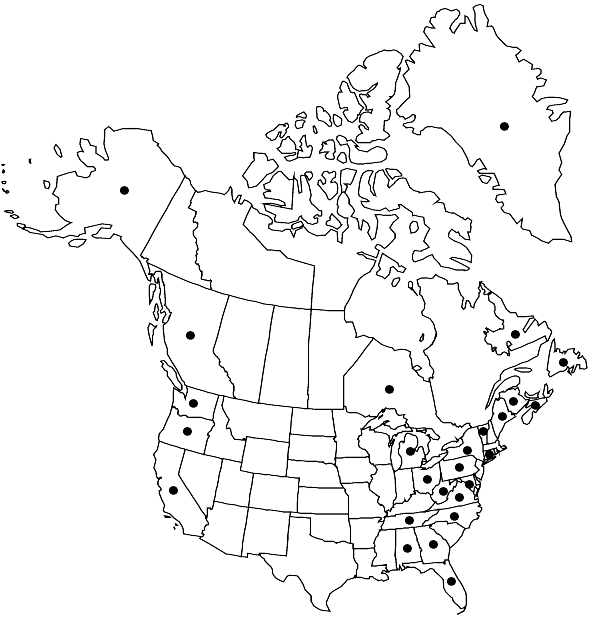Andreaea rothii
Bot. Taschenbuch, 386, plate 11, figs. 7, 8. 1807,.
Plants brown to black. Leaves erect-spreading, occasionally secund, broadly subulate from an ovate base, widest in proximal half of leaf, apex symmetric; costa present, percurrent and usually filling the leaf apices, moderately differentiated to strong, terete, reaching the leaf insertion; leaf margins entire or occasionally weakly crenulate; basal laminal cells quadrate to occasionally short-rectangular, marginal cells mostly quadrate or rounded, walls usually sinuose; medial laminal cells quadrate, 1-stratose to nearly completely 2-stratose, lumens roundedquadrate; laminal papillae rare, low. Sexual condition clad or gonioautoicous; perichaetial leaves differentiated, convolute-sheathing. Spores 35–60 (–70) µm.
Habitat: Siliceous rock, cliffs, boulders
Elevation: low to high elevations
Distribution

Greenland, B.C., N.B., Nfld. and Labr., N.S., Ont., Ala., Alaska, Calif., Conn., Fla., Ga., Maine, Md., Mich., N.Y., N.C., Ohio, Oreg., Pa., Tenn., Vt., Va., Wash., W.Va., n, c Europe
Discussion
H. A. Crum and L. E. Anderson (1981) did not recognize as Andreaea crassinervia those eastern North American specimens otherwise referable to A. rothii with excurrent or poorly defined costae (not bordered by laminal cells in the subula). B. M. Murray (1987) excluded A. crassinervia from the Arctic, while M. F. V. Corley et al. (1981) submerged it in A. rothii. The essentially European A. rothii var. falcata (Schimper) Lindberg (A. rothii var. papillosa Müller Hal.) is only poorly distinguished from the typical variety and does not warrant recognition here, at least on the basis of the single specimen reported for the flora area. The previously used traits of spore size and costa filling the acumen or not intergrade between those taxa.
Selected References
None.
Lower Taxa
"widest" is not a number.